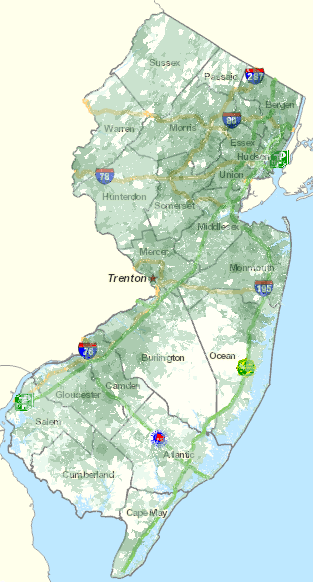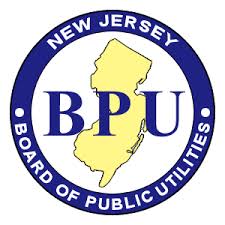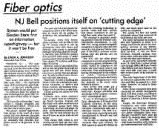 Verizon has been upset with the tone and accuracy of many New Jersey residents who have written the state’s Board of Public Utilities urging them to reject a settlement offer than would allow Verizon to walk away from its commitment to deliver high-speed broadband to 100% of the state.
Verizon has been upset with the tone and accuracy of many New Jersey residents who have written the state’s Board of Public Utilities urging them to reject a settlement offer than would allow Verizon to walk away from its commitment to deliver high-speed broadband to 100% of the state.
While calling many of its opponents misinformed about the company’s original commitments, a Verizon spokesperson targeted a particularly nasty response to one of its strongest critics — Teletruth’s Bruce Kushnick, who has accused Verizon of breaking its promises in New Jersey and substituting outdated DSL and expensive, usage-capped 4G wireless broadband as a broadband equivalent.

Northwest, central and southern New Jersey all lack solid broadband coverage. (Map: Connecting NJ)
Kushnick has argued that Verizon has cooked the books, diverting funds that should have been spent on FiOS expansion into its more profitable wireless subsidiary Verizon Wireless instead. He wants New Jersey to conduct a thorough investigation of Verizon’s financial reporting and learn why the company has reneged on a broadband commitment that originally promised a minimum of 45/45Mbps high-speed broadband for 100% of the state by 2010 in return for rate deregulation and tax breaks. Verizon got the deregulation and tax breaks but much of the state is still waiting for the faster broadband it was promised.
Now Verizon wants the state to approve a settlement that will redefine its commitment from 45/45Mbps to 4Mbps DSL or wireless 4G broadband.
Verizon spokesman Lee Gierczynski said criticisms about the company’s performance in New Jersey are “way off base.” He said there never was any commitment to deploy FiOS across all of New Jersey because FiOS did not exist at the time of the original agreement.
“Nobody knew what FiOS was 20 years ago,” Gierczynski said. “It wasn’t until 2004 when FiOS came on the scene.”
What about the 45/45Mbps speed commitment?
“[The agreement] didn’t say a minimum of 45Mbps,” Gierczynski said, “it just says ‘up to’.”
Gierczynski particularly bristled over Kushnick’s ongoing criticisms of Verizon.
“For nearly two decades, he has made the same, tired baseless allegations over and over again about Verizon and its predecessor companies — not only in New Jersey but in other states as well,” Gierczynski told The Record in an email. “His specious arguments are devoid of fact, relying on misinformation and myths to prop up his claims. This filing is no different.”
With more than 1,000 comments on file with the BPU, Verizon invited the regulator to dismiss critics that demanded Verizon live up to its original commitments:
“The vast majority of comments opposing the Stipulation that have been posted by the Board to date were submitted via a standard form letter generated by the New Jersey State AFLCIO with the subject line “Tell Verizon to Live Up to the Opportunity New Jersey Agreement.”
“Other comments opposing the Stipulation offer inaccurate claims about what was contemplated by Opportunity New Jersey or what is in the Stipulation.”
“AFL-CIO Letters: These letters opposing the Stipulation appear less convincing when the locations of senders are examined— More than 25 are from people located outside of New Jersey and some appear to be from municipalities not in Verizon’s service territory. “
Verizon did not bother to mention the circulation of a pro-Verizon form letter that was submitted by hundreds of people, many Verizon employees and retirees, as reported last week by Stop the Cap!
Two of those letters were signed by Paul A. Sullivan, Verizon’s regional president of consumer and mass business markets in New Jersey and Tracy Reed, a Verizon manager… in Atlanta. Neither identified themselves as Verizon management.
Further concerns were raised by Kushnick when he found that the people and businesses Verizon touts as supporting Verizon’s position all have some relationship with Verizon:
- New Jersey Technology Council — Board member, Douglas Schoenberger, VP, Public Policy, Verizon NJ, Inc
- The Meadowlands Chamber of Commerce — Donnett Barnett Verley, Director of Public Policy and Corporate Responsibility, for Verizon New Jersey. “I am responsible for Verizon’s philanthropic and community outreach efforts throughout the state. I serve as an active board member of …the Meadowlands Chamber of Commerce.”
- Greater Paterson Chamber of Commerce — “Hi. I’m Rick Ricca, Director – External Affairs. I am responsible for the company’s relationship and interaction with municipal and county governments… I also serve on… Greater Paterson Chamber of Commerce.”
- The Commerce and Industry Association of New Jersey (“CIANJ”), Member of the Board, Sam Delgado V.P. Community & Stakeholder Affairs Verizon
- Greater Elizabeth Chamber of Commerce — “Verizon, a telecommunication company received the Member-to-Member Award for its important contribution to Elizabeth’s business.”
- Cooper’s Ferry Partnership —Verizon is on the Board of Directors. “The organization’s operational budget is currently divided into three main categories: board membership… investments from these valued partners that has allowed CFP to grow its mission and expand throughout the city of Camden.”
- Puerto Rican Association for Human Development —“Verizon Presents $20,000 to PRAHD”
- Latino Institute — Our Partners and Funders, Verizon
- Gudino, David Joseph — Associate General Counsel, Verizon Wireless
- NJ SHARES —“Verizon New Jersey partners with NJ SHARES for Communications Lifeline outreach and enrollment efforts.”
“In fact, it’s hard to identify any legitimate group that supports the Verizon stipulation and is not funded by Verizon,” said Kushnick.


 Subscribe
Subscribe
 By “advanced communications services,” the letter’s signers should know very well that means more 4G LTE wireless broadband with stingy usage caps and high prices, not more FiOS fiber to the home service.
By “advanced communications services,” the letter’s signers should know very well that means more 4G LTE wireless broadband with stingy usage caps and high prices, not more FiOS fiber to the home service. Judith Stoma’s family has worked for Verizon/NJ Bell since 1958. She’s 71 years old today and she supports Verizon, at least in its efforts to “lead the way with N.J. at the forefront of technology.” Abdicating on FiOS expansion in favor of the same old DSL service Verizon proposes in its settlement seems to run contrary to that goal.
Judith Stoma’s family has worked for Verizon/NJ Bell since 1958. She’s 71 years old today and she supports Verizon, at least in its efforts to “lead the way with N.J. at the forefront of technology.” Abdicating on FiOS expansion in favor of the same old DSL service Verizon proposes in its settlement seems to run contrary to that goal.





 McAdam believes there is nothing wrong with prioritizing some Internet traffic over others, and he believes that future is already becoming a reality.
McAdam believes there is nothing wrong with prioritizing some Internet traffic over others, and he believes that future is already becoming a reality.
